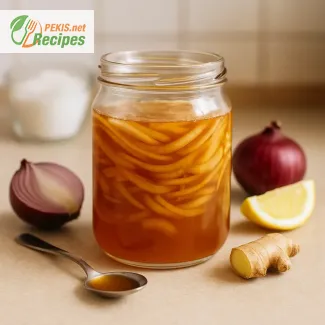
Natural home remedy for soothing persistent coughs
Discover the timeless healing power of onion syrup
When it comes to natural remedies that stand the test of time, few can compete with the simplicity and effectiveness of a homemade onion cough syrup. Passed down through generations and rooted in traditional folk medicine, this syrup is a beloved staple in households across the world. Not only is it incredibly easy to make with everyday ingredients, but its comforting flavor and powerful properties make it a go-to remedy for soothing sore throats, calming dry coughs, and supporting respiratory wellness.
At the heart of this remedy lies the humble onion, a pantry essential known not just for its culinary versatility but also for its natural antibacterial and anti-inflammatory benefits. When combined with sugar or honey and allowed to gently release its juices, the result is a sweet, slightly spicy syrup that can help ease cough symptoms and loosen mucus. This old-fashioned preparation method extracts the beneficial compounds from the onion without the need for cooking, preserving its natural goodness and making it suitable even for children (over one year of age if honey is used).
Why onion cough syrup remains a trusted home remedy
There’s something undeniably comforting about returning to simple, traditional methods when caring for yourself or loved ones. Unlike commercial cough syrups that often contain artificial flavorings, preservatives, or alcohol, this homemade onion syrup offers a pure, gentle alternative that relies on the natural potency of its ingredients.
In many cultures, from Eastern Europe to the Mediterranean, onion syrup is considered a staple remedy during the cold season. Whether you're fighting off a lingering dry cough, dealing with irritated throat tissues, or simply trying to boost your immune response, a spoonful of this syrup delivers quick, soothing relief.
What sets this recipe apart is its accessibility. With just an onion and a natural sweetener like raw honey or cane sugar, anyone can prepare this remedy in a matter of hours. It doesn’t require any special tools or skills—just a bit of patience while the syrup forms through maceration. The result is a golden, aromatic liquid that stores well and tastes surprisingly pleasant, especially when made with red onions, which impart a milder, sweeter flavor.
Taste and texture: a surprisingly pleasant experience
Many people expect onion-based remedies to be sharp or unpleasant, but onion cough syrup is known for its unexpectedly mild, caramel-like flavor, especially when balanced with a high-quality sweetener. The syrup is smooth in texture, slightly viscous, and pleasantly warming. For children or adults who are hesitant, adding a few drops of lemon juice or ginger extract can enhance the flavor while adding more health-supporting benefits.
This syrup is traditionally taken by the spoonful, either on its own or mixed into a warm herbal tea. Its gentle, warming quality makes it especially comforting before bedtime or first thing in the morning when coughs tend to be the most disruptive.
When to use and how to store your onion syrup
Onion cough syrup is most commonly used during the cold and flu season, but it can be beneficial year-round for anyone experiencing minor throat irritation, hoarseness, or chronic coughs due to dry air or allergens. Thanks to its natural preservative properties, especially when made with honey, it can last in the refrigerator for up to a week. This makes it an ideal make-ahead remedy to keep on hand during times of seasonal illness or sudden changes in weather.
Simply store it in a clean glass jar with a lid and use a clean spoon each time to avoid contamination. Some people prefer to make small batches every few days to ensure freshness, and because it takes so little time and effort to prepare, that’s a practical option for most households.
More than a remedy – a tradition of care
Preparing onion syrup for coughs is more than just mixing ingredients—it's an act of nurturing and tradition. There’s a kind of quiet mindfulness in slicing the onions, layering them with sweetener, and waiting for the syrup to form. It brings a sense of connection to past generations who relied on the healing properties of plants long before modern pharmaceuticals.
Offering a spoonful of this homemade syrup to a coughing child, partner, or friend is a gesture filled with warmth, care, and intention. It’s these small rituals—rooted in knowledge, trust, and nature—that make traditional remedies like this one not only effective but emotionally comforting as well.
Simple, safe, and effective
Whether you're looking for a natural alternative to over-the-counter cough syrups or simply curious about home remedies that actually work, onion cough syrup is a tried-and-true recipe worth keeping in your wellness toolkit. It's easy to make, uses ingredients you already have at home, and has been relied upon for centuries to provide gentle relief from common respiratory discomforts.
It’s not just a remedy—it’s a small, sweet promise of comfort when you or your loved ones need it most.
- Peel and slice the onion into thin rings or half-moons. The thinner the slices, the more effectively they will release their juices.
- Place the first layer of onion slices into a clean glass jar.
- Sprinkle a layer of sugar over the onions. If using honey, replace sugar with equal volume and skip the layering—mix instead.
- Repeat the layering process (onion, then sugar) until all ingredients are used. If using lemon juice or ginger, add them between layers.
- Seal the jar loosely with a lid or cover it with clean gauze secured with a rubber band. Do not close it airtight.
- Let the jar sit at room temperature (preferably in a dark place) for 6–8 hours. The sugar will draw out the onion juice, creating a syrup.
- Once a syrup has formed, strain it through a fine mesh sieve or cheesecloth into a clean, sterilized bottle.
- Store in the refrigerator for up to 1 week.
Usage: Take 1 teaspoon (5 ml) of syrup every few hours as needed to relieve cough or sore throat.
Ways to enhance the flavor and benefits of homemade onion syrup
Smart ingredient choices that elevate tradition
Homemade onion cough syrup is a time-tested remedy with a loyal following, but that doesn’t mean it can’t be enhanced or refined. By carefully selecting certain ingredients or adjusting the preparation process, you can make your syrup more effective, better tasting, or even healthier. While the original version calls for just onions and sugar (or honey), there are many thoughtful modifications that bring additional layers of flavor, function, and appeal without compromising its natural qualities.
How ingredient choices can upgrade your syrup
Changing or adding specific ingredients can significantly alter the taste and boost the health benefits of onion syrup. Here are some tested improvements:
Use red onions for a milder taste
While traditional recipes often suggest yellow onions due to their strong compounds, red onions offer a milder, slightly sweeter flavor and are often better received by children or those sensitive to pungent aromas. Red onions are also rich in anthocyanins, powerful antioxidants that add an extra boost to the syrup’s healing potential.
Swap white sugar for raw honey
Instead of granulated sugar, using raw organic honey not only improves the taste but also adds powerful antibacterial properties. Honey soothes the throat, enhances the texture of the syrup, and supports the immune system. However, it’s important to avoid honey for children under 1 year of age due to the risk of botulism.
Add ginger for warmth and anti-inflammatory benefits
Adding a few thin slices of fresh ginger root gives the syrup a warming, slightly spicy note. Ginger is a well-known natural remedy for nausea, congestion, and inflammation. It also complements the onion’s flavor, making the syrup more complex and palatable.
A touch of lemon for brightness
Adding a small amount of fresh lemon juice introduces acidity that balances the sweetness and adds vitamin C, which is crucial for immune defense. The tangy note also makes the syrup more pleasant to take on its own or mixed into warm drinks.
Why homemade is better than store-bought
When compared to commercial cough syrups, a homemade onion version is free from artificial additives, colorings, and preservatives. You are in control of every ingredient, ensuring purity and suitability for specific dietary needs. Furthermore, the homemade process preserves delicate compounds found in raw onions and honey, which may otherwise degrade under industrial processing or pasteurization.
Making it at home also allows you to customize the taste, which is particularly helpful for children or people with sensitivities. A homemade version can be adjusted for texture, sweetness, and even aroma to make it as pleasant and effective as possible.
Common mistakes to avoid
While making onion syrup is a straightforward process, there are several pitfalls to watch out for:
Using cooked onions
Some variations involve boiling the onions, but this can destroy heat-sensitive compounds such as allicin, which is responsible for many of the onion’s antimicrobial properties. Stick to the traditional cold-extraction method by layering raw onions with sugar or honey and allowing the syrup to develop over time.
Closing the jar airtight
An airtight seal may seem logical, but it can cause fermentation or spoilage, especially if the syrup is made with fresh produce and left at room temperature. Always cover the jar loosely or use breathable gauze to let air circulate.
Using too much sweetener
Adding excessive sugar or honey can overwhelm the onion’s natural taste and reduce the syrup’s effectiveness. Maintain a balanced ratio that extracts juices effectively without making it cloyingly sweet.
Leaving it too long at room temperature
While a few hours are needed for proper extraction, leaving the syrup for more than 12 hours at room temperature can lead to fermentation or unwanted microbial growth. Strain and refrigerate the syrup after the recommended 6–8 hours.
Healthier alternatives and modern adaptations
Those looking to reduce sugar intake or avoid traditional sweeteners can opt for natural sugar alternatives like coconut sugar, stevia, or maple syrup. While these may slightly alter the consistency and shelf life, they still help create a syrupy base that draws out the onion’s active compounds.
For a vegan-friendly alternative that avoids honey but still offers a smooth texture and depth of flavor, agave syrup is a suitable option. It pairs well with ginger and lemon and has a low glycemic index.
If texture is a concern, especially for young children, the syrup can be gently blended and strained to ensure it’s perfectly smooth and easy to swallow.
A boost with herbs and spices
You can also consider infusing the syrup with natural herbs such as thyme, which has natural expectorant properties, or sage, known for calming sore throats. A small sprig placed between the onion layers can gently release these herbs’ essential oils without overpowering the base flavor.
Adding a pinch of cayenne pepper can stimulate circulation and open sinuses, though it should be used cautiously and in small amounts.
Crafting a ritual around wellness
Making onion syrup can become more than just a remedy—it can be part of a wellness ritual. Preparing it during the first signs of illness creates a sense of care and readiness, and the time spent slicing, layering, and waiting reinforces a slow, intentional approach to healing.
As you experiment with improving your syrup, you may also find ways to incorporate it into daily life—perhaps a teaspoon in the morning with warm water and lemon, or stirred into a soothing bedtime tea.
Personalized healing in every jar
The beauty of this traditional remedy is its simplicity and adaptability. By understanding how each ingredient contributes to its healing power, you can personalize the syrup to suit your needs, taste, and health goals. From enhancing flavor with citrus and herbs to improving benefits with powerful add-ins like ginger and honey, this humble syrup offers endless possibilities for refinement—all while keeping you connected to a timeless tradition of natural healing.
Contains allergens: None directly, but check for honey (if used) in case of infant safety (not suitable for children under 1 year).
Gluten: This recipe is naturally gluten-free.
Substitution tips:
- Sugar substitute: Replace granulated sugar with honey (for added antimicrobial properties) or maple syrup.
- Low-sugar option: Use stevia or erythritol, though syrup texture may change slightly.
- Vitamin C: 1.2 mg – supports the immune system and acts as an antioxidant.
- Vitamin B6: 0.01 mg – aids in metabolism and cognitive development.
- Potassium: 7 mg – important for muscle function and blood pressure regulation.
- Manganese: 0.02 mg – supports bone health and wound healing.
- Quercetin: 3 mg – has anti-inflammatory and antihistamine properties.
- Sulfur compounds (allicin): trace – supports detoxification and antimicrobial activity.
These components contribute to immune support, respiratory relief, and anti-inflammatory action, making onion cough syrup a natural and effective home remedy.





